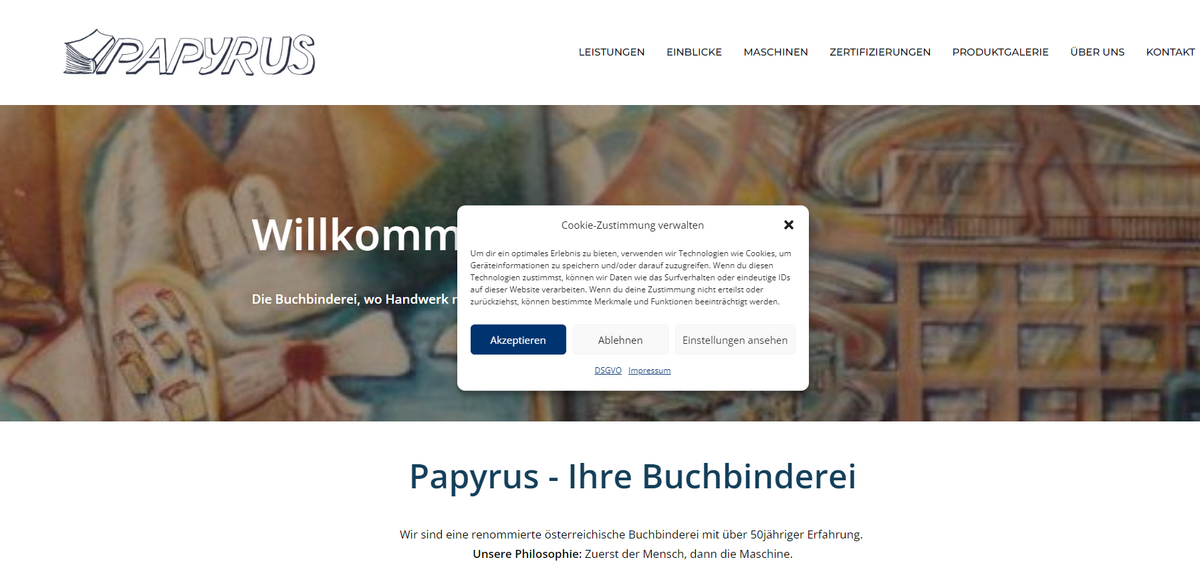In the heart of Austria, Papyrus stands as a beacon of craftsmanship and sustainability. With over 50 years of experience, this bookbinding company has not only mastered the art of binding books but has also committed itself to sustainable practices that align with global goals. The focus is on people first, machines second. This philosophy ensures that every book produced is a testament to quality and care.
Key Features
- Over 50 years of expertise in bookbinding.
- Commitment to employee satisfaction and safety.
- Use of sustainable materials and practices.
- Integration of modern technology with traditional techniques.
- Focus on continuous education and training for employees.
1. A Legacy of Craftsmanship
Founded in 1970, Papyrus has grown from a small bookbinding shop to Austria’s most efficient bookbindery. The journey began with a vision to create high-quality books. The founders, Gerhard Wolkerstorfer and Peter Marusa, believed in the power of craftsmanship. They knew that a book is not just a collection of pages; it is a work of art. This belief has been passed down through generations, ensuring that every employee understands the importance of their role in the process.
2. People First, Machines Second
At Papyrus, the workforce is a diverse mix of young and old. This blend of experience and fresh ideas creates a dynamic environment. Employees are not just workers; they are valued members of a family. The company prioritizes a healthy and safe working environment. Training and continuous education are essential. This commitment to employee well-being translates into high-quality products that customers can trust.
3. Sustainable Practices in Bookbinding
Sustainability is at the core of Papyrus’s operations. The company has received certifications from PEFC and FSC, ensuring that the materials used are sourced responsibly. This commitment to sustainable forestry means that future generations will have access to healthy forests. The use of eco-friendly materials is not just a trend; it is a responsibility. Papyrus aims to minimize its environmental impact while delivering exceptional products.
4. Innovative Technology Meets Tradition
While Papyrus cherishes its traditional techniques, it also embraces modern technology. The company boasts a powerful machine park designed for medium and high-volume binding projects. This combination of old and new allows for the production of unique printed products. The latest generation of machines works alongside older models, ensuring that no technique is lost. This balance is crucial for maintaining quality while meeting customer demands.
5. Commitment to Continuous Improvement
Continuous improvement is a key principle at Papyrus. The company invests in its employees, providing them with the tools and training needed to excel. This focus on development ensures that the team remains motivated and engaged. Customers benefit from this commitment, as they receive products that reflect the highest standards of quality. Papyrus is not just about making books; it is about making a difference.
Conclusion: Aligning with Sustainable Development Goals
- Goal 4: Quality Education – Through training and continuous education.
- Goal 8: Decent Work and Economic Growth – Providing a safe and healthy work environment.
- Goal 12: Responsible Consumption and Production – Using sustainable materials and practices.
- Goal 13: Climate Action – Commitment to reducing environmental impact.
- Goal 15: Life on Land – Supporting sustainable forestry practices.
In conclusion, Papyrus is more than just a bookbinding company. It is a leader in sustainable practices, committed to quality, craftsmanship, and the well-being of its employees. By aligning its operations with the United Nations Sustainable Development Goals, Papyrus is paving the way for a brighter, more sustainable future.
For more information, visit Papyrus.


















